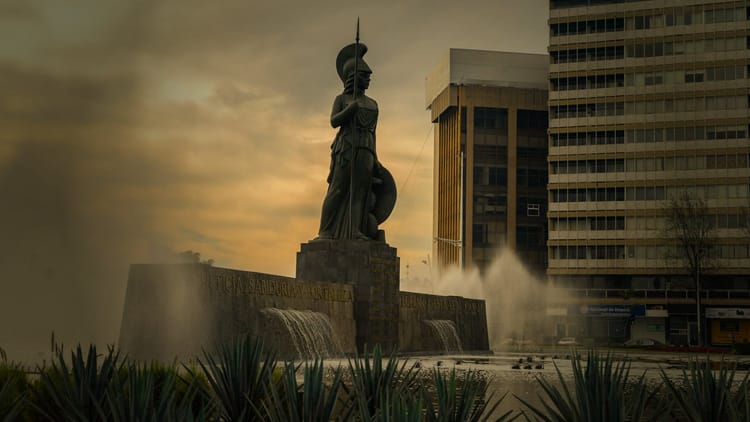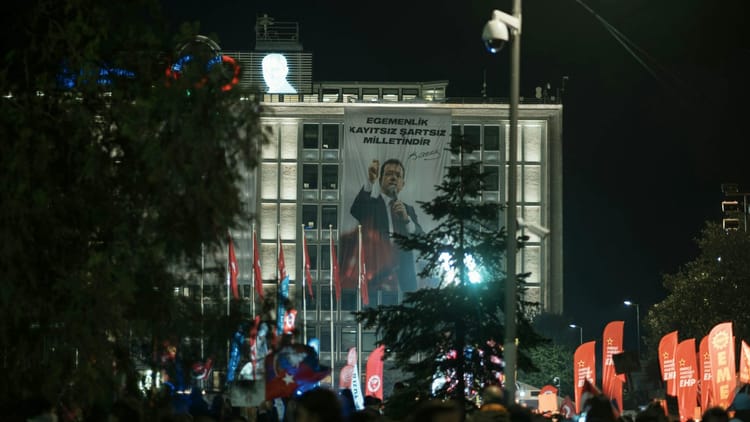Everything but the plan

Recently: Why are investors down on AI? Daron Acemoglu on excesses of enthusiasm, returns on investment, and the distinctive nature of human reasoning.
Today: The American president’s escalating military pressure on Venezuela goes against his own Pentagon's warning: Toppling the country’s dictator would trigger “chaos for a sustained period of time with no possibility of ending it.” What’s Trump doing?
+ For members: Why would a country sacrifice thousands of soldiers to another’s war for almost nothing in return? Rachel Minyoung Lee on North Korea’s long game, its alliance with China and Russia, and what Kim Jong Un really wants.
& New music from Wata Igarashi ...
The day-after problem
U.S. government war games from Trump’s first term predicted “chaos for a sustained period of time with no possibility of ending it” if Venezuela’s President Nicolás Maduro fell from power, according to findings reported on Thursday by The New York Times. Military units, political factions, Colombian guerrilla groups—all would fight for control, the national-security consultant Douglas Farah wrote in an unclassified 2019 report to Pentagon officials after participating in the exercises. Any U.S. deployment to stabilize the country would require tens of thousands of troops.
President Donald Trump has been escalating military pressure on Venezuela anyway. Since September, the U.S. has conducted 21 strikes on boats near Venezuela, killing 83 people the administration calls drug traffickers. The USS Gerald R. Ford—America’s largest warship—arrived in the region last week with 15,000 troops. Trump hasn’t ruled out a ground invasion. What’s he trying to achieve?
In his 2024 campaign, the president ran explicitly against “forever wars.” In his first term, his Venezuela policy triggered a migration crisis that he also ran against. His own Pentagon’s analysis warned that toppling Maduro would end badly. Yet he’s moved extensive military assets into position and ordered the CIA to conduct covert operations. The administration says Maduro must go but won’t explain what happens next. Asked whether the U.S. had planned for Maduro’s exit, a senior official told the Times only that the administration is “well aware of all outcomes.” The International Crisis Group analyst Phil Gunson, writing from Caracas with an alternative perspective: “The thing that really worries us is that they don’t appear to have any serious plan for what happens afterward.”

Meanwhile
- ’Seditious behavior, punishable by death.’ On Thursday, Trump seemed to call for the execution of six Democratic lawmakers—all military or intelligence veterans—who appeared in a video reminding U.S. troops they must refuse illegal orders. “SEDITIOUS BEHAVIOR, punishable by DEATH!” the president posted. He also reposted, “HANG THEM GEORGE WASHINGTON WOULD!!” The lawmakers released the video on Tuesday after hearing concerns from service members about strike legality. … Also on Thursday, Federal Judge Jia Cobb ruled that Trump’s deployment of the National Guard in Washington, D.C., was illegal.
- Scam factories galore. The military in Burma announced on Wednesday that they’d raided an online scam compound near the Thai border, detaining 346 foreigners and seizing 10,000 mobile phones. The Shwe Kokko raid follows October’s operation at nearby KK Park, where authorities arrested more than 2,000 people. The United Nations estimates that hundreds of scam centers operate in Burma’s borderlands, generating nearly US$40 billion annually through romance and investment schemes. China has pressured the Burmese military government to crack down after thousands of Chinese citizens became victims.
- An unfortunate first for modern Spain. The Spanish Supreme Court convicted Attorney General Álvaro García Ortiz on Thursday of leaking confidential information about the partner of an opposition politician, banning García Ortiz from office for two years. This is Spain’s first criminal conviction of a sitting attorney general—after he leaked an email about Alberto González Amador, who was under investigation for tax fraud. González Amador is the partner of the Madrid regional leader Isabel Díaz Ayuso.
- Ghosts of Biafra. A Nigerian court sentenced separatist leader Nnamdi Kanu to life in prison on Thursday after convicting him on seven terrorism charges. Judge James Omotosho said Kanu’s broadcasts incited deadly attacks on security forces. Kanu seeks to revive Biafra, which seceded in 1967, triggering a civil war that killed at least 3 million people before Biafran troops surrendered in 1970. Prosecutors sought the death penalty. Omotosho chose mercy: “The death penalty is now being frowned upon by the international community.”
- Back to sea without explanation. Iran released a Marshall Islands-flagged tanker with 21 crew members on Wednesday after detaining the ship for several days without explanation. Cyprus-based Columbia Shipmanagement said the crew are “safe and in good spirits” and that “no allegations were made against the vessel, her crew, and the vessel’s managers and owners.” Iran has periodically seized vessels in the Persian Gulf, often in apparent retaliation for Western sanctions or as leverage in broader disputes.

All newsletter, no noise
Khaki is a free app built exclusively for managing and reading newsletters. Clean interface, no distractions, and only the newsletters you want to see—not everything else in your usual inbox.
Sign up with Gmail and the access code NEWSLETTER to try it for yourself.
Feature
Asia’s new axis
Why would a country sacrifice thousands of soldiers to another’s war for almost nothing in return? Rachel Minyoung Lee on North Korea’s long game, its alliance with China and Russia, and what Kim Jong Un really wants.

More than a year after North Korea began dispatching soldiers to Russia’s war in Ukraine, the alliance between Pyongyang and Moscow has increasingly involved Beijing in what observers describe as a coordinated effort to reshape Asia’s political landscape. Conspicuously, the economics don’t add up: According to a recent analysis, North Korea has contributed between US$5.6 billion and $9.8 billion to Russia’s war effort through arms shipments and troop deployments, while receiving only $457 million to $1.19 billion in return—mostly food, oil, and air-defense systems. For a regime that sends thousands of soldiers to their deaths and carefully manages public rhetoric about their sacrifices, the imbalance raises a question: What’s North Korea’s Supreme Leader Kim Jong Un actually after?
This week in The Signal, Rachel Minyoung Lee explores Pyongyang’s strategy, the Russia-China-North Korea triangle, and what it all might mean for nuclear negotiations and regional stability …
Your loyal guide to a changing world.
Membership with The Signal means exclusive access to premium benefits:
- Regular profiles on the questions behind the headlines
- In-depth feature interviews with our network of specialist contributors from across America and around the world
- The despatch, our weekly current-affairs and cultural-intelligence briefing
- Early access to new products, including print extras
It also means vital support for an independent new enterprise in current-affairs journalism.
New music
‘Supernova’
Wata Igarashi, one of the leading figures of the Japanese techno scene, has returned with a new album, My Supernova—a whirling array of sound, all set to a pounding four-four thump.





